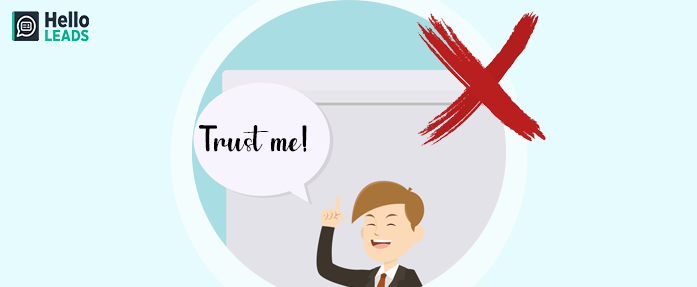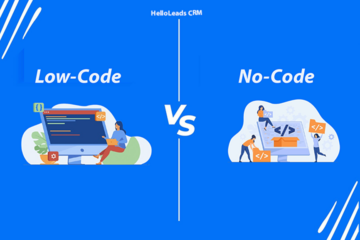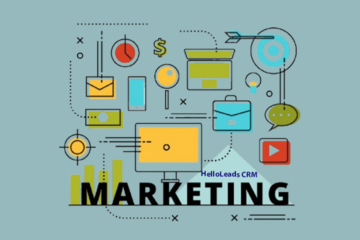
“Approach each customer with the idea of helping him or her to solve a problem or achieve a goal, not of selling a product or service” – Brian Tracy
Salespersons need to don different hats during their conversations. This is because a salesperson needs to interact with people who possess different working and conversation styles. So, a salesperson must have effective communication skills to manage sales conversations with prospects.
According to Steve Martin, author of human nature of complex sales, just 18% of salespeople are seen by prospects as trusted advisors whom they respect. The words and phrases we choose can determine whether a sale promotion succeeds or fails.
In a sales conversation, some words and phrases will build bridges between salesperson and prospect while others will build walls. That’s why a salesperson needs to keep things simple and avoid unnecessary usage of words and phrases which does not add any value to their conversation. The words/phrases you choose will determine your direction. However, if you know the proper usage of words/phrases in a sales conversation, you can easily close deals. To help you in doing an effective sales conversation, here are five phrases that can be avoided while you are in a sales conversation.
1 . “I’m just checking in…”
“Just checking in” is a commonly used expression. This statement directly contradicts what marketing seeks to accomplish. “Just checking in” is problematic because it implies that you are being self-centered in your follow-up. It centers on what we want from potential customers. Rather than displaying selfishness, if the salesperson can contribute to the prospect’s company’s success, the salesperson can gain the prospect’s attention.
Best practice: Don’t just check in; instead, add value by sharing one of the below-listed items.
- Send them a how-to guide
- Point out business challenges
- Does our previous mail address your queries
- Mention a potential opportunity
- Share a relevant industry article to meet their goal
- Comment on social media
- Answer a question on an online forum
- Reference a relevant blog post
2 . “I want to learn more about your company and your role…”
People believe that this is a simple conversation starting query. However, during the initial conversation, the salesperson should demonstrate that they are highly knowledgeable, dependable, and optimistic about the customers’ target. Better start by demonstrating your interest in the buyers’ business success rather than by asking the prospect or company questions or gathering information.
Best Practice: Bring a specific point of discussion to the table, such as, “I saw that you’re acquiring X company and wanted you to know that we can help make sure everything is 100% compatible between your systems…”
3 . “If I can solve your X, Y, Z problem, would you be ready to buy today?”
Your ultimate objective is to offer a superior solution to the prospect’s problem to secure a potential client for your sale. However, the fact behind this question shows that you are blatantly attempting to lure your prospect into your sales by using this phrase. Instead of saying this, engage the prospect in conversation and find solutions to their problems. You can assist them, identify benefits, add value, and let the prospect decide if it’s a good fit.
Best Practice:
- Bring insight to overcome their problems
- Know their challenges to articulate the issues
- Guide them through a clear process that helps them to determine whether your solution solves their problems
4 . “I guarantee the lowest price if we close this deal today….”

This statement implies that your main concern is with financial gains rather than with value. Additionally, using this phrase implies that you are pressuring the prospect to accept your offer right away. Instead of putting them under pressure, respect their process and timeline when making purchasing decisions.
Best Practice: Instead of mentioning low price/discount below types of conversations can be taken forward.
- Focus on the value that your product brings and the benefits it offers
- I am aware that this is a significant choice and that you probably have many people to persuade. We have a few different brochures that speak directly to people in various roles — I can send those to you or directly to your other stakeholders if you prefer.
5 . “Just trust me…”

Asking a prospect to trust you without providing any reasons or evidence can come across as manipulative. Why do you need to say that you are truthful? Are you not a trustworthy person by nature? This phrase has no real meaning and might make someone suspicious of you.
Best Practice: Instead of building trust through transparency, you prove it with action by providing the prospect with relevant information and being upfront about any potential challenges or limitations of your product.
Conclusion:
While it’s important to have faith in your product and its abilities, blatantly declaring that it is the best can come across as being arrogant and give the impression that you aren’t paying attention to your prospect’s needs. You could concentrate on emphasizing the special qualities and advantages of your product and let the potential customer decide if it’s a good fit for them.
You can make or break a potential sale as a salesperson with your words. It’s crucial to pick them wisely and to refrain from saying anything that might turn off a potential client or harm your relationship with them.
Share this blog :










